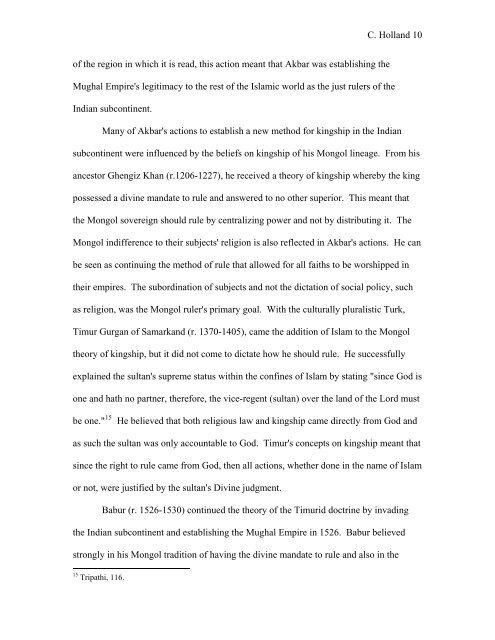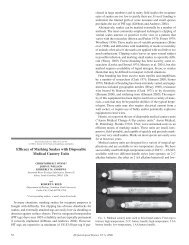Akbar and the Mughal State - University of Georgia
Akbar and the Mughal State - University of Georgia
Akbar and the Mughal State - University of Georgia
You also want an ePaper? Increase the reach of your titles
YUMPU automatically turns print PDFs into web optimized ePapers that Google loves.
<strong>of</strong> <strong>the</strong> region in which it is read, this action meant that <strong>Akbar</strong> was establishing <strong>the</strong><br />
C. Holl<strong>and</strong> 10<br />
<strong>Mughal</strong> Empire's legitimacy to <strong>the</strong> rest <strong>of</strong> <strong>the</strong> Islamic world as <strong>the</strong> just rulers <strong>of</strong> <strong>the</strong><br />
Indian subcontinent.<br />
Many <strong>of</strong> <strong>Akbar</strong>'s actions to establish a new method for kingship in <strong>the</strong> Indian<br />
subcontinent were influenced by <strong>the</strong> beliefs on kingship <strong>of</strong> his Mongol lineage. From his<br />
ancestor Ghengiz Khan (r.1206-1227), he received a <strong>the</strong>ory <strong>of</strong> kingship whereby <strong>the</strong> king<br />
possessed a divine m<strong>and</strong>ate to rule <strong>and</strong> answered to no o<strong>the</strong>r superior. This meant that<br />
<strong>the</strong> Mongol sovereign should rule by centralizing power <strong>and</strong> not by distributing it. The<br />
Mongol indifference to <strong>the</strong>ir subjects' religion is also reflected in <strong>Akbar</strong>'s actions. He can<br />
be seen as continuing <strong>the</strong> method <strong>of</strong> rule that allowed for all faiths to be worshipped in<br />
<strong>the</strong>ir empires. The subordination <strong>of</strong> subjects <strong>and</strong> not <strong>the</strong> dictation <strong>of</strong> social policy, such<br />
as religion, was <strong>the</strong> Mongol ruler's primary goal. With <strong>the</strong> culturally pluralistic Turk,<br />
Timur Gurgan <strong>of</strong> Samark<strong>and</strong> (r. 1370-1405), came <strong>the</strong> addition <strong>of</strong> Islam to <strong>the</strong> Mongol<br />
<strong>the</strong>ory <strong>of</strong> kingship, but it did not come to dictate how he should rule. He successfully<br />
explained <strong>the</strong> sultan's supreme status within <strong>the</strong> confines <strong>of</strong> Islam by stating "since God is<br />
one <strong>and</strong> hath no partner, <strong>the</strong>refore, <strong>the</strong> vice-regent (sultan) over <strong>the</strong> l<strong>and</strong> <strong>of</strong> <strong>the</strong> Lord must<br />
be one." 15 He believed that both religious law <strong>and</strong> kingship came directly from God <strong>and</strong><br />
as such <strong>the</strong> sultan was only accountable to God. Timur's concepts on kingship meant that<br />
since <strong>the</strong> right to rule came from God, <strong>the</strong>n all actions, whe<strong>the</strong>r done in <strong>the</strong> name <strong>of</strong> Islam<br />
or not, were justified by <strong>the</strong> sultan's Divine judgment.<br />
Babur (r. 1526-1530) continued <strong>the</strong> <strong>the</strong>ory <strong>of</strong> <strong>the</strong> Timurid doctrine by invading<br />
<strong>the</strong> Indian subcontinent <strong>and</strong> establishing <strong>the</strong> <strong>Mughal</strong> Empire in 1526. Babur believed<br />
strongly in his Mongol tradition <strong>of</strong> having <strong>the</strong> divine m<strong>and</strong>ate to rule <strong>and</strong> also in <strong>the</strong><br />
15 Tripathi, 116.





